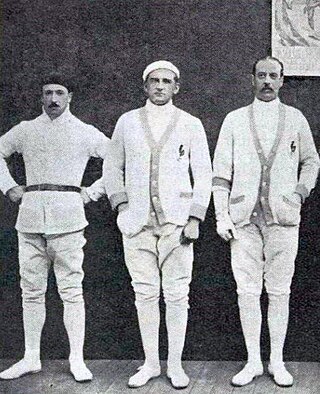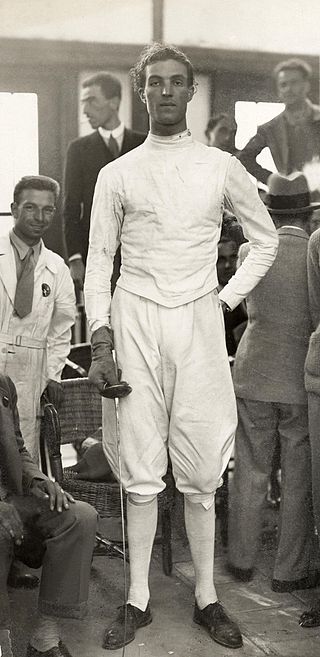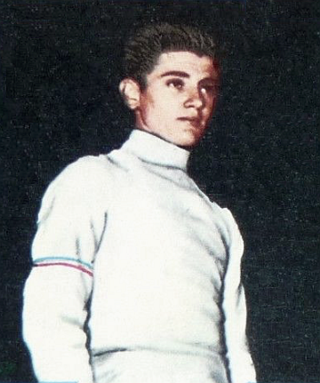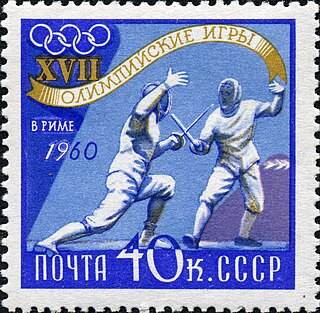
The men's épée was one of four fencing events on the Fencing at the 1908 Summer Olympics programme. The competition was held from 17 to 24 July 1908 at the Franco-British Exhibition fencing grounds. There were 85 competitors from 13 nations. Each nation could enter up to 12 fencers. The medals were swept by the French fencers, who also took the gold medal in the team épée event. Gaston Alibert was the gold medalist, with Alexandre Lippmann taking silver and Eugene Olivier bronze. Officially, it was the second consecutive medal sweep in the event, though two of the three "Cuban" fencers who medaled in 1904 were actually American.

The men's foil was one of eight fencing events on the fencing at the 1964 Summer Olympics programme. It was the fourteenth appearance of the event. The competition was held from October 13 to October 14, 1964. 55 fencers from 21 nations competed. Nations had been limited to three fencers each since 1928. The event was won by Egon Franke of Poland, the nation's first victory in the men's foil. France returned to the podium after a one-Games absence, with Jean-Claude Magnan taking silver and Daniel Revenu the bronze.

The men's épée was one of eight fencing events on the fencing at the 1964 Summer Olympics programme. It was the fourteenth appearance of the event. The competition was held from October 18 to 19 1964. 65 fencers from 25 nations competed. Each nation was limited to three fencers. The event was won by Grigory Kriss of the Soviet Union, the nation's first gold medal in the event after a bronze four years earlier. The Soviets also took bronze, with Guram Kostava finishing in third place. Between the two was silver medalist Bill Hoskyns of Great Britain; it was the second consecutive Games with a British silver medalist in the event. Italy's six-Games gold medal streak in the men's individual épée ended with the nation missing the podium entirely; Gianluigi Saccaro finished fourth after losing the bronze-medal barrage to Kostava.

The men's sabre was one of eight fencing events on the fencing at the 1964 Summer Olympics programme. It was the fifteenth appearance of the event. The competition was held from October 19 to 20, 1964. 52 fencers from 21 nations competed. Nations had been limited to three fencers each since 1928. The event was won by Tibor Pézsa, the final of nine straight Games in which a Hungarian fencer won the event. The silver medal went to Claude Arabo of France, with Umyar Mavlikhanov of the Soviet Union taking bronze.

The men's épée was a fencing event held as part of the Fencing at the 1912 Summer Olympics programme. It was the fourth appearance of the event, which had been introduced in 1900. The competition was held from 11 to 13 July at the Östermalm Athletic Grounds. There were 93 competitors from 15 nations. Each nation could enter up to 12 fencers. The event was won by Paul Anspach of Belgium. His countryman Philippe le Hardy took bronze. Silver went to Denmark's Ivan Joseph Martin Osiier, the only medal won by the perennial Olympian who competed in seven Games over 40 years. The medals were the first in the men's épée for both nations.

The men's épée was a fencing event held as part of the fencing at the 1920 Summer Olympics programme. It was the fifth appearance of the event. A total of 80 fencers from 13 nations competed in the event, which was held from August 20 to 23, 1920. Each nation was limited to eight fencers, down from 12 in 1908 and 1912. Of the six fencing events, the only one in which Nedo Nadi did not win a gold medal was the one in which he did not compete. Instead, a trio of Frenchmen swept the medals. It was Lippmann's second silver medal in the event, he having previously taken second in 1908; he was the second man to win multiple medals in the individual épée.

The men's foil was one of seven fencing events on the Fencing at the 1928 Summer Olympics programme. It was the seventh appearance of the event. The competition was held from 31 July 1928 to 1 August 1928. 54 fencers from 22 nations competed. For the third straight Games, the limit of fencers per nation was reduced. The event was won by Lucien Gaudin of France, the nation's second consecutive and fourth overall victory in the men's foil. Erwin Casmir earned silver to give Germany its first medal in the event. Giulio Gaudini of Italy took bronze.

The men's foil was one of seven fencing events on the fencing at the 1932 Summer Olympics programme. It was the eighth appearance of the event. The competition was held from 2 to 4 August 1932. 26 fencers from 12 nations competed, with one other entered but not starting. Each nation was limited to three fencers. The event was won by Gustavo Marzi of Italy, the nation's third victory in the men's foil. His countryman Giulio Gaudini took bronze for the second consecutive Games, becoming the fourth man to win multiple medals in the event. Joe Levis gave the United States its first men's foil medal with his silver.

The men's épée was one of seven fencing events on the fencing at the 1936 Summer Olympics programme. It was the ninth appearance of the event. The competition was held from 9 August 1936 to 11 August 1936. 68 fencers from 26 nations competed. Nations were limited to three fencers. The event was won by Franco Riccardi of Italy, the nation's second consecutive victory in the men's épée. Riccardi's teammates Saverio Ragno and Giancarlo Cornaggia-Medici took silver and bronze, respectively, to give Italy a medal sweep—Italy's first and the fourth overall in the event. Cornaggia-Medici, who had won gold in 1932, became the fourth man to win multiple medals in the individual épée. For the first time, France competed in the event but did not win any medals.

The men's foil was one of seven fencing events on the fencing at the 1936 Summer Olympics programme. It was the ninth appearance of the event. The competition was held from 5 August 1936 to 6 August 1936. 62 fencers from 22 nations competed. Nations were limited to three fencers. The event was won by Giulio Gaudini of Italy, the nation's second consecutive and fourth overall victory in the men's foil. Gaudini, who had won bronze medals in 1928 and 1932, was the first man to win three medals in the event. His countryman Giorgio Bocchino took bronze. Edward Gardère put France back on the podium after a one-Games absence.

The men's épée was one of seven fencing events on the fencing at the 1948 Summer Olympics programme. It was the tenth appearance of the event. The competition was held from 7 August 1948 to 9 August 1948. 66 fencers from 25 nations competed. The event was won by Luigi Cantone of Italy, the nation's third consecutive victory in the men's épée. Italy also earned its third consecutive bronze medal in the event, with Edoardo Mangiarotti's third-place finish. Between the two Italians was Oswald Zappelli of Switzerland, taking the silver medal.

The men's foil was one of seven fencing events on the fencing at the 1948 Summer Olympics programme. It was the tenth appearance of the event. The competition was held from 3 August 1948 to 4 August 1948. 63 fencers from 25 nations competed. The event was won by Jehan Buhan of France, the nation's first victory in the men's foil since 1928 and fifth overall. His countryman Christian d'Oriola took silver, while Lajos Maszlay earned Hungary's first medal in the men's individual foil with his bronze.

The men's sabre was one of seven fencing events on the fencing at the 1948 Summer Olympics programme. It was the eleventh appearance of the event. The competition was held from 12 August 1948 to 13 August 1948. 60 fencers from 24 nations competed. Nations were limited to three fencers each. The event was won by Aladár Gerevich, the fifth of nine straight Games in which a Hungarian would win the event. Gerevich became the third man to win multiple medals in the individual sabre, adding to his 1936 bronze. Vincenzo Pinton of Italy took silver and Pál Kovács of Hungary took bronze; it was the third straight Games where the sabre podium was Hungary-Italy-Hungary.

The men's épée was one of seven fencing events on the fencing at the 1952 Summer Olympics programme. It was the eleventh appearance of the event. The competition was held from 27 July 1952 to 28 July 1952. 76 fencers from 29 nations competed. Nations were limited to three fencers each. The event was won by Edoardo Mangiarotti of Italy, the nation's fourth consecutive victory in the men's épée. It was also the fourth consecutive year that Italy had at least two fencers on the podium in the event, as Edoardo's brother Dario Mangiarotti took silver. Bronze went to Oswald Zappelli of Switzerland. Zappelli and Edoardo Mangiarotti had faced each other in a barrage for silver and bronze medals in 1948, which Zappelli had won; the two men were the fifth and sixth to earn multiple medals in the event.

The men's foil was one of seven fencing events on the fencing at the 1952 Summer Olympics programme. It was the eleventh appearance of the event. The competition was held from 23 July 1952 to 24 July 1952. 61 fencers from 25 nations competed. All three medallists were left-handed. Nations were limited to three fencers each since 1928. The event was won by Christian d'Oriola of France, the nation's second consecutive victory in the men's foil and sixth overall. D'Oriola was the fifth man to win multiple medals in the event. The silver and bronze medals were won by Edoardo Mangiarotti and Manlio Di Rosa of Italy.

The men's sabre was one of seven fencing events on the fencing at the 1952 Summer Olympics programme. It was the twelfth appearance of the event. The competition was held from 31 July 1952 to 1 August 1952. 66 fencers from 26 nations competed. Nations were limited to three fencers each. The event was won by Pál Kovács, the sixth of nine straight Games in which a Hungarian would win the event. Kovács became the fourth man to win multiple medals in the individual sabre, adding to his 1948 bronze. Hungary swept the medals in the event for the second time. Aladár Gerevich's silver completed a set of three different color medals in the event, the first man to win three medals in individual sabre. Tibor Berczelly earned bronze.

The men's épée was one of seven fencing events on the fencing at the 1956 Summer Olympics programme. It was the twelfth appearance of the event. The competition was held on 30 November 1956. 41 fencers from 18 nations competed. Nations were limited to three fencers each. The event was won by Carlo Pavesi of Italy, the nation's fifth consecutive victory in the men's épée. In all five of those Games, Italy earned at least two medals in the event; this was the second sweep during that period for Italy. Giuseppe Delfino was the silver medalist while Edoardo Mangiarotti took bronze. It was Mangiarotti's third medal in the event, along with gold in 1952 and another bronze in 1948; he was the first man to win three medals in the individual épée.

The men's foil was one of eight fencing events on the fencing at the 1960 Summer Olympics programme. It was the thirteenth appearance of the event. The competition was held from 29 – 30 August 1960. 78 fencers from 31 nations competed. Nations had been limited to three fencers each since 1928. The event was won by Viktor Zhdanovich of the Soviet Union, with his countryman Yury Sisikin the runner-up; they were the nation's first medals in the event. The Soviets nearly swept the medals, with Mark Midler advancing to a three-man barrage for third place before finishing in fifth place. Albie Axelrod's bronze put the United States on the podium for the event for the first time since 1932. Traditional powers Italy and France, who between them had won 11 of 12 gold medals and 9 of 12 silver, were kept off the podium entirely.

The men's épée was one of eight fencing events on the fencing at the 1960 Summer Olympics programme. It was the thirteenth appearance of the event. The competition was held from 5 to 6 September 1960. 79 fencers from 32 nations competed. Each nation was limited to three fencers. The event was won by Giuseppe Delfino of Italy, the nation's sixth consecutive victory in the men's épée. Delfino, who had taken silver in 1956, was the seventh man to win multiple medals in the event. Silver went to Allan Jay of Great Britain and bronze to Bruno Habārovs of the Soviet Union, the first-ever medal in the event for both nations. It was the first time during Italy's gold-medal streak that the nation did not have a second medalist as well.

The men's épée was one of eight fencing events on the fencing at the 1976 Summer Olympics programme. It was the seventeenth appearance of the event. The competition was held from 22 to 23 July 1976. 64 fencers from 26 nations competed. Each nation was limited to 3 fencers. The event came down to a three-way barrage among the medalists, with two West German fencers joining Győző Kulcsár of Hungary in this tie-breaker fencing session. Alexander Pusch won against both opponents in the barrage to take gold, with Hans-Jürgen Hehn defeating Kulcsár for silver. The medals were the first for West Germany in the men's individual épée. Kulcsár's bronze made him the second man to earn three medals in the event.




















